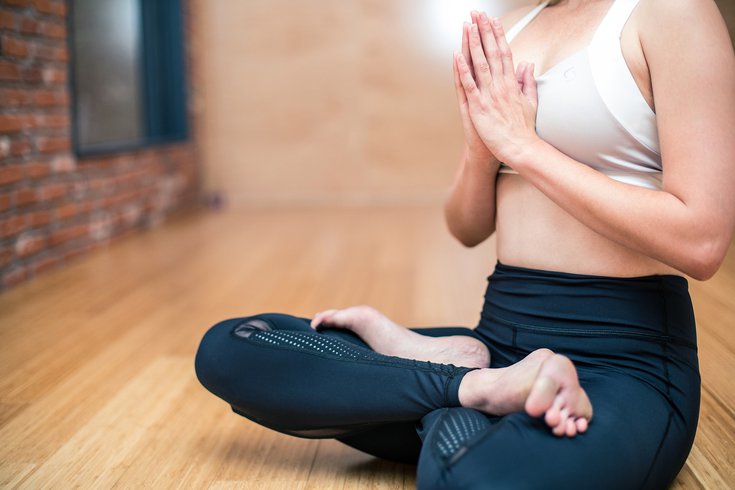
March 20, 2023
 Logra Studio/Pixabay
Logra Studio/Pixabay
Yoga, which involves a combination of physical poses, controlled breathing and mediation, has been found to reduce the stress response and reduce depression and anxiety.
Exercise provides tangible benefits for mental health – just as it does for physical health. Research shows that physical activity boosts mood and relieves symptoms of depression and anxiety.
But should it be offered as prescription medicine? That's still up for debate.
Though many studies have shown the mental health benefits of staying active, many scientists say more research is needed to determine the types of exercise – and the amounts that work best – before exercise can be considered a standard treatment alongside drugs and therapy.
Research shows that regular exercise can boost mood, relieve stress, improve self-esteem and even improve cognitive functions. Exercise also has been linked to many other benefits, including improved sleep, better endurance, increased energy and stamina, weight reduction, lower cholesterol and improved cardiovascular fitness.
Exercise releases feel-good endorphins, brain chemicals that relieve stress and improve well-being. This helps stop the cycle of negative thoughts that can lead to depression and anxiety. Exercise also promotes the growth of new neurons in certain areas of the brain, including the hippocampus, which is largely responsible for memory and learning capabilities.
Regular exercise not only can reduce the risk of anxiety and depression, but it also can help relieve symptoms of both conditions, according to the Mayo Clinic.
Completing at least 30 minutes of exercise three to five days each week may significantly improve depression or anxiety symptoms, studies show. But smaller amounts of physical activity — as little as 10 to 15 minutes at a time — also can be beneficial.
In one recent analysis, researchers found that prescribing exercise as a treatment for severe depression was at least as effective as other standard medical interventions including drugs and psychotherapy.
The findings showed that almost any type of exercise reduced depression symptoms, although some were more beneficial than others. Moderate exercise, such as walking, had the best effect, but more intense workouts, like running and weight training, were nearly as effective. Even light exercise reduced symptoms.
Andreas Heissel, an exercise scientist at the University of Potsdam in Germany, told The Washington Post that people with depression don't need to train for a marathon or maintain an intense exercise regimen to see a difference in their symptoms.
"The best exercise is the one that is actually done," Heissel said. "And that means exercise that is rewarding or pleasant."
The positive effects of exercise are strong enough to warrant making it a first-line treatment for depression, Heissel added.
The American Psychological Association's clinical practice guidelines, last updated in 2019, do not mention exercise as a treatment for depression. They limit treatment options to psychotherapy and antidepressants.
Another recent study, from the University of Ottawa, found that exercise may decrease suicide attempts, but it did not show a significant decrease in suicidal ideation or mortality. The researchers said more studies are needed to investigate exercise's effect on mental health, but they also said health care providers should not worry about prescribing exercise to these patients.
Other researchers have been studying exercise's effect on conditions like panic disorder and post-traumatic stress disorder. Data suggests that it helps relieve feelings of fear and worry in people with panic disorders. It also may reduce PTSD symptoms like heightened reactions, anxiety or depressed mood.
Some experts are wary of making exercise a first-line treatment for mental health conditions, because there is not enough evidence on the dose, intensity and type of exercise that provide the best results. Clinical trials are needed to directly compare exercise interventions to drug therapy and psychotherapy, but these types of studies are not easy to carry out, they say.
Instead, they suggest exercise be recommended in addition to other interventions.
"Without downplaying the effectiveness of exercise as an effective treatment method, I don't think I would go so far as to say it's the only thing people should try," Morgan Bailee Boggess McCoy, a mental health clinician in Kentucky, told Healthline. "In my experience, a combination of counseling/talk therapy and a change in lifestyle factors works the best."
Yoga, Tai Chi and aerobic exercise often are recommended for their mood-boosting effects. Yoga which involves a combination of physical poses, controlled breathing and mediation, has been found to reduce the stress response and reduce depression and anxiety by lowering heart rate and blood pressure and decreasing physiological arousal, the body's response to emotional stimuli.
Studies show that Tai Chi, which involves a combination of meditation, controlled breathing and body movement, also can reduce stress and anxiety, and improve depressed mood. Aerobic exercise, such as running, cycling and swimming, also is associated with better mental health.
The bottom line, though, is that any type of exercise is better than nothing, for both physical and mental health. Experts advise choosing a routine that keeps you motivated and feeling good, and to check with a health care provider before starting any new workout.